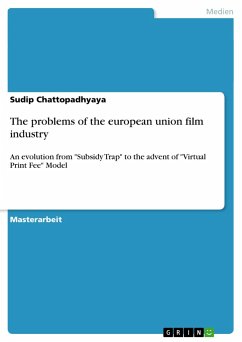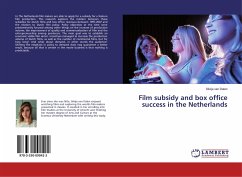Masterarbeit aus dem Jahr 2012 im Fachbereich Medien / Kommunikation - Film und Fernsehen, Universidade dos Açores, Sprache: Deutsch, Abstract: The market share of Gross Box Office (GBO) of European films have been experiencing a steady fall in recent years while the Hollywood films continue to claim more than 60% of market share within Europe. Every country of EU has devised public aid mechanism in the form of subsidies and tax concessions to protect the domestic film industry with a view to augment national film's market share against Hollywood's domination. Though the state interventions on the ground of cultural protectionism have been the integral part of EU's policy to protect the domestic film industry and to uphold its cultural sovereignty, the effectiveness of the economic policies needs to be investigated to ascertain whether these policies are boosting European film industry or wasting public money.
Hence, to assess the impact of the economic policies on the domestic film market, this study examine the impact of subsidy and tax concession on the self-sufficiency ratio, defined as the market share of GBO of domestic films, and attempt to identify other determinants namely market size, the number of domestic films produced and the average budget per film that explain the variance of self-sufficiency ratio in a country. Panel data of six years from 2005 to 2010 are used from twenty-seven countries of EU that have their own film industries. The results of OLS, fixed-effects and random-effects regression show that the subsidy and tax concession are not a significant predictor of the self-sufficiency ratio suggesting that the currently prevalent economic policy of public aid in EU might be ineffective. The study finds little evidence that the average budget per film and the number of domestic films produced are important determinant of the self-sufficiency ratio. Through the inclusion of GDP as
Hinweis: Dieser Artikel kann nur an eine deutsche Lieferadresse ausgeliefert werden.
Hence, to assess the impact of the economic policies on the domestic film market, this study examine the impact of subsidy and tax concession on the self-sufficiency ratio, defined as the market share of GBO of domestic films, and attempt to identify other determinants namely market size, the number of domestic films produced and the average budget per film that explain the variance of self-sufficiency ratio in a country. Panel data of six years from 2005 to 2010 are used from twenty-seven countries of EU that have their own film industries. The results of OLS, fixed-effects and random-effects regression show that the subsidy and tax concession are not a significant predictor of the self-sufficiency ratio suggesting that the currently prevalent economic policy of public aid in EU might be ineffective. The study finds little evidence that the average budget per film and the number of domestic films produced are important determinant of the self-sufficiency ratio. Through the inclusion of GDP as
Hinweis: Dieser Artikel kann nur an eine deutsche Lieferadresse ausgeliefert werden.








